Selected Works of George Stanley Faber (7 vols.)
Digital Logos Edition
Overview
A prominent critic of the Oxford movement, George Stanley Faber was one of the most influential Anglican theologians of the nineteenth century. The Selected Works of George Stanley Faber includes his most authoritative works derived from his lifetime of scholarship in patristic studies. With his comprehensive knowledge of the early Church Fathers and their texts, Faber’s books deftly articulated the anti-Roman Catholic Church position unpopular with many of his contemporaries. His books, upon publication, would often lead to contentious debate among both Anglican and Roman Catholic theologians.
In the Selected Works of George Stanley Faber you will find his work on the doctrine of election, the doctrine of justification, the doctrine of regeneration, and the doctrine of transubstantiation, as well as his two volume treatise on the nature of the Trinity. Faber’s astute observations on these topics stem from his insightful elucidations of the early Church Fathers, including Ignatius, Polycarp, Origen, Tertullian, Augustine, and more.
This title is included in the following collections
You can save when you purchase this product as part of a collection.
Logos 6 Anglican Gold Legacy L...
$849.99$849.99Logos 5 Anglican Gold Legacy L...
$849.99$849.99Logos 6 Anglican Platinum Lega...
$1,499.99$1,499.99Logos 5 Anglican Platinum Lega...
$1,499.99$1,499.99
- $2,999.99
- $2,999.99
- $2,999.99
- $4,749.99
- $4,749.99
- $4,749.99
- $24,999.99

- Detailed appendices
- Full introduction to each book by the author
Mr. Faber is an ingenious and learned writer.
—The Christian Remembrancer
The name of Faber is a sufficient guarantee for soundness, and learning, and integrity.
—The Church of England Quarterly Review
Mr. Faber’s work bears the marks of knowledge, and diligence.
—The Quarterly Theological Review and Ecclesiastical Record
- Title: Selected Works of George Stanley Faber
- Author: George Stanley Faber
- Volumes: 7
- Pages: 2,478
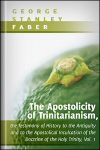
George Stanley Faber’s The Apostolicity of Trinitarianism is a significant book on the nature of the divine unity, and the difference of doctrine—regarding the Trinity—between the Anglican Church and the Catholic Church. Beginning at the first Council of Nice, A.D. 325, and retrogressively working up to the apostolic age, Faber examines the testimonies and documents of the early Church to expound the eanthropic nature of Jesus in the Trinity.
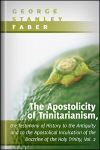
Volume two of George Stanley Faber’s The Apostolicity of Trinitarianism focuses on the works of Athanasius, Origen, Tertullian, and Justin Martyr to explain the doctrine of Christ’s divinity. Also included in this volume is a detailed ten-part appendix with passages of Scripture pertaining to the Trinity along with Faber’s commentary.
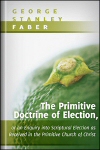
George Stanley Faber fashions his argument against predestination by examining the works and testimonies from the early Church. Taking issue with both Arminianistic and Calvinistic doctrines of election, Faber argues that predestination was first cited by St. Augustine and not taught by the first fathers of the Church. Exploring the Old and New Testament, Faber’s exploration of free will and faith is thought provoking.
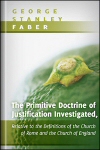
Elucidating the distinctions on the doctrine of Justification between the Church of Rome and the Church of England, George Stanley Faber’s The Primitive Doctrine of Justification Investigated then explores the texts of the early Church Fathers to determine how they viewed the nature of justification. A major doctrinal difference between these two churches, Faber’s exhaustive research and articulate observations shed light on this long-standing disagreement.
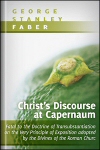
Analyzing the works of Tertullian, Cyprian, Clement of Alexandria, Origen, Athanasius, Cyril of Jerusalem, Jerome, and St. Augustine, George Stanley Faber examines the doctrine of transubstantiation and its interpretations. This treatise on the Eucharist is a captivating review of some of the earliest Christian writers and is a methodical review of the structure of Christ’s discourse at Capernaum.
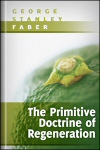
An in-depth examination of spiritual and moral regeneration, George Stanley Faber’s observations on the subject of baptism is insightful. Faber once again relies on the texts of the early Christian writers to formulate his position that the doctrine of regeneration is a “moral change of disposition.”
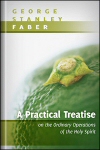
In his Preface, George Stanley Faber writes, “All, that will, may be saved: for our Lord hath expressly declared, that, whosoever cometh unto him, he will in no wise cast him out.” Faber’s Treatise explains that merely professing one’s faith is not enough. Rather, it is one’s actions that prove to God dedication and faithfulness. Faber provides a wonderful spiritual guidebook for daily Christian living.
George Stanley Faber (1773–1854) was a prolific author and Anglican theologian educated at University College, Oxford. In 1801 he was a Bampton lecturer at the University of Oxford. A controversial writer, he published over twenty books, most of which provoked discussion and debate.
Reviews
3 ratings

Dustin Payne
9/27/2014
AeliusCicero
6/19/2014

Larry Proffitt (I
4/16/2014